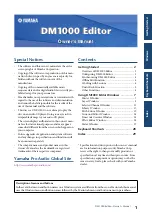
Configuring EAPS Shared Ports
ExtremeWare XOS 11.3 Concepts Guide
413
Figure 25: EAPS domain common link failure
When the common link is restored, the controller goes into Preforwarding state. After the controller
receives notification from the master nodes that they have converged and blocked their secondary ports,
the controller opens all ports.
If you have an EAPS configuration with multiple common links and a second common link fails, the
controllers continue to take steps to prevent a superloop. In addition to having one controller with an
“Active-Open” port, the controller with the smallest link ID becomes the “root blocker.” There can be
only one “root blocker” in the network.
Port Considerations
In an EAPS shared port configuration, the segment ports are sorted in ascending order based on their
port number, not the order you add an EAPS domain to EAPS shared ports. This is particularly useful
when planning your EAPS configuration.
The benefit of sorting ports in ascending order is evident if a common link fails. The port with the
lowest port number among the segment ports in the “UP” state becomes the “Active Open” port. When
configuring your EAPS domain, keep the port numbers in mind. For high bandwidth links, utilize
lower port numbers, and for low bandwidth links, utilize higher port numbers. This way, if a common
link fails, the high bandwidth link is still available.
NOTE
The order you add EAPS domains to EAPS shared ports is relevant if the EAPS domains have matching ring ports
and participate in spatial reuse. In this case, the
show eaps shared-port {<port>} {detail}
command
displays the newly added EAPS domain after all other existing EAPS domains with the same matching ring port.
To display EAPS shared port status information, use the following command:
show eaps shared-port {<port>} {detail}
EW_102b
S4
S5
S3
EAPS1
Partner
S9
S11
S10
S1
S2
EAPS2
EAPS3
Controller
S6
S8
S7
Master
Master
Master
P1
P2
P3
P4
x
Active-Open
Summary of Contents for ExtremeWare XOS 11.3
Page 20: ...Contents ExtremeWare XOS 11 3 Concepts Guide 20...
Page 25: ...1 Using ExtremeWare XOS...
Page 26: ......
Page 38: ...ExtremeWare XOS Overview ExtremeWare XOS 11 3 Concepts Guide 38...
Page 58: ...Accessing the Switch ExtremeWare XOS 11 3 Concepts Guide 58...
Page 146: ...Configuring Slots and Ports on a Switch ExtremeWare XOS 11 3 Concepts Guide 146...
Page 218: ...Status Monitoring and Statistics ExtremeWare XOS 11 3 Concepts Guide 218...
Page 240: ...Virtual LANs ExtremeWare XOS 11 3 Concepts Guide 240...
Page 248: ...Virtual Routers ExtremeWare XOS 11 3 Concepts Guide 248...
Page 278: ...Access Lists ACLs ExtremeWare XOS 11 3 Concepts Guide 278...
Page 288: ...Routing Policies ExtremeWare XOS 11 3 Concepts Guide 288 entry deny_rest if then deny...
Page 344: ...Security ExtremeWare XOS 11 3 Concepts Guide 344...
Page 393: ...2 Using Switching and Routing Protocols...
Page 394: ......
Page 454: ...Spanning Tree Protocol ExtremeWare XOS 11 3 Concepts Guide 454...
Page 484: ...Extreme Standby Router Protocol ExtremeWare XOS 11 3 Concepts Guide 484...
Page 514: ...IPv4 Unicast Routing ExtremeWare XOS 11 3 Concepts Guide 514...
Page 530: ...IPv6 Unicast Routing ExtremeWare XOS 11 3 Concepts Guide 530...
Page 538: ...RIP ExtremeWare XOS 11 3 Concepts Guide 538...
Page 556: ...OSPF ExtremeWare XOS 11 3 Concepts Guide 556...
Page 566: ...OSPFv3 ExtremeWare XOS 11 3 Concepts Guide 566...
Page 589: ...3 Appendixes...
Page 590: ......
Page 640: ...CNA Agent ExtremeWare XOS 11 3 Concepts Guide 640...
Page 670: ...Glossary ExtremeWare XOS 11 3 Concepts Guide 670...
Page 698: ...Index ExtremeWare XOS 11 3 Concepts Guide 698...
















































